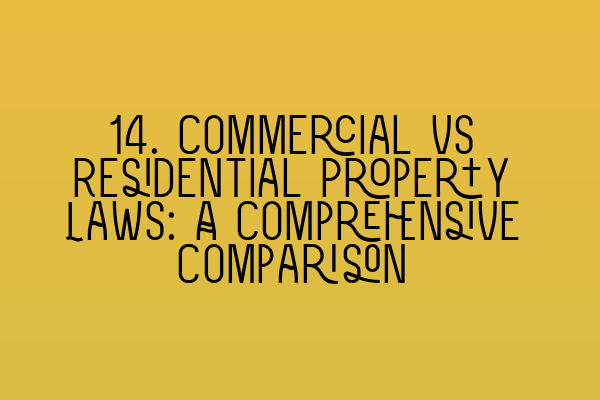Commercial vs Residential Property Laws: A Comprehensive Comparison
As a solicitor, it is important to have a deep understanding of property law in order to effectively navigate the legal landscape for clients. One key distinction that often arises in property law is the difference between commercial and residential property. Each type of property comes with its own set of laws and regulations that must be followed. In this comprehensive comparison, we will explore the main differences between commercial and residential property laws.
1. Purpose of Use
The primary distinction between commercial and residential property lies in their purpose of use. Commercial property is intended for business or commercial activities, such as offices, retail stores, industrial buildings, and warehouses. On the other hand, residential property is used for living purposes, including single-family homes, apartments, and condominiums.
2. Leases and Tenancies
When it comes to leasing commercial and residential properties, there are significant differences in the rights and responsibilities of landlords and tenants. Commercial leases tend to be lengthier and more complex, often involving negotiations on rent, lease duration, and specific property use. Residential leases, on the other hand, are generally more standardized and offer stronger tenant protections.
3. Rent Control
Rent control is an important aspect of residential property laws in many jurisdictions. It is a form of government regulation that restricts the amount landlords can increase rents and provides stability for tenants. In contrast, rent control does not typically apply to commercial properties, as businesses are seen to have more bargaining power and are less in need of protection.
4. Landlord-Tenant Relationships
The relationship between landlords and tenants also differs between commercial and residential properties. Commercial leases are typically structured as business-to-business contracts, where the parties negotiate terms and conditions. In residential properties, there is often a power imbalance between landlords and tenants, leading to greater regulation and protection for tenants.
5. Planning and Zoning Regulations
Planning and zoning regulations play a crucial role in determining how land can be used. Commercial properties are subject to more stringent zoning restrictions, as authorities seek to maintain the balance between different types of businesses and preserve the overall character of an area. Residential properties are also subject to zoning regulations but tend to have fewer restrictions.
6. Property Taxes
Commercial and residential properties are typically subject to different property tax rates. Commercial properties often have higher tax rates due to their potential for generating income. Residential properties, especially primary residences, may benefit from tax breaks and exemptions.
7. Financing and Mortgages
Obtaining financing for commercial and residential properties can also differ significantly. Commercial property loans tend to have more stringent requirements, such as higher down payments, stricter credit checks, and additional financial documentation. Residential property loans are generally more accessible and have more favorable terms for individuals.
8. Dispute Resolution
In commercial property disputes, parties often turn to alternative dispute resolution methods, such as negotiation, mediation, or arbitration, to avoid the costs and time associated with litigation. Residential property disputes may also utilize these methods, but there are often additional protections and remedies available to residential tenants through landlord-tenant legislation.
9. Liability
Liability issues can vary between commercial and residential properties. Commercial property owners have a higher duty of care towards their customers and tenants, as they invite them onto the premises for business purposes. Residential property owners have a duty to maintain the property in a safe condition for tenants but are generally not responsible for injuries that occur due to a tenant’s actions or negligence.
Conclusion
Commercial and residential property laws have distinct characteristics that are vital to grasp as a solicitor or someone navigating the property landscape. Understanding the differences in purpose, leases, rent control, landlord-tenant relationships, planning regulations, property taxes, financing, dispute resolution, and liability is essential to provide effective legal advice and representation.
To enhance your legal knowledge and prepare for the SQE exams, check out our related articles:
– SQE 1 Practice Exam Questions
– SQE 1 Practice Mocks FLK1 FLK2
– SQE 2 Preparation Courses
– SQE 1 Preparation Courses
– SRA SQE Exam Dates
Expand your knowledge and advance your understanding of property law to better serve your clients and excel in your legal career.
Disclaimer: The information provided in this blog post is for general informational purposes only and does not constitute legal advice. Please consult with a qualified solicitor for advice specific to your situation.
